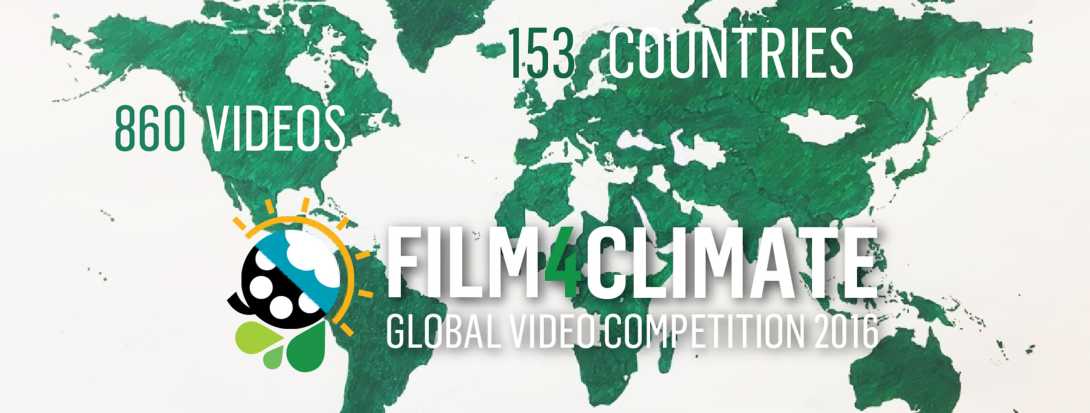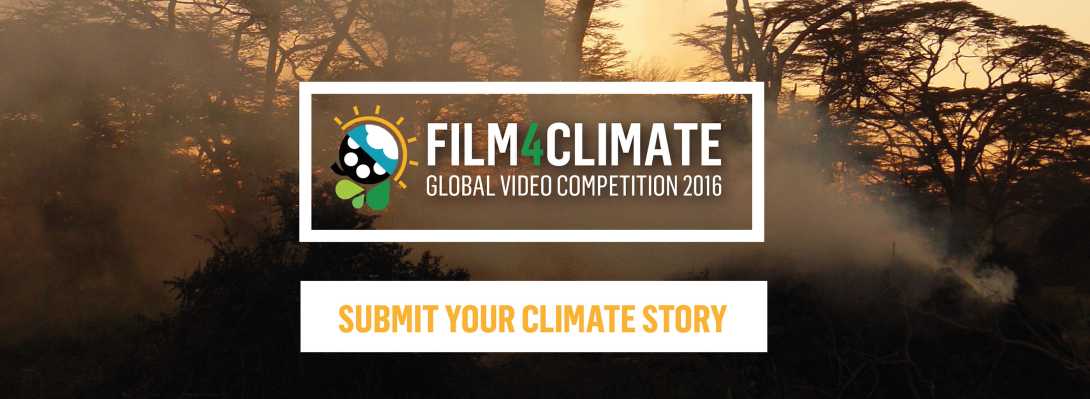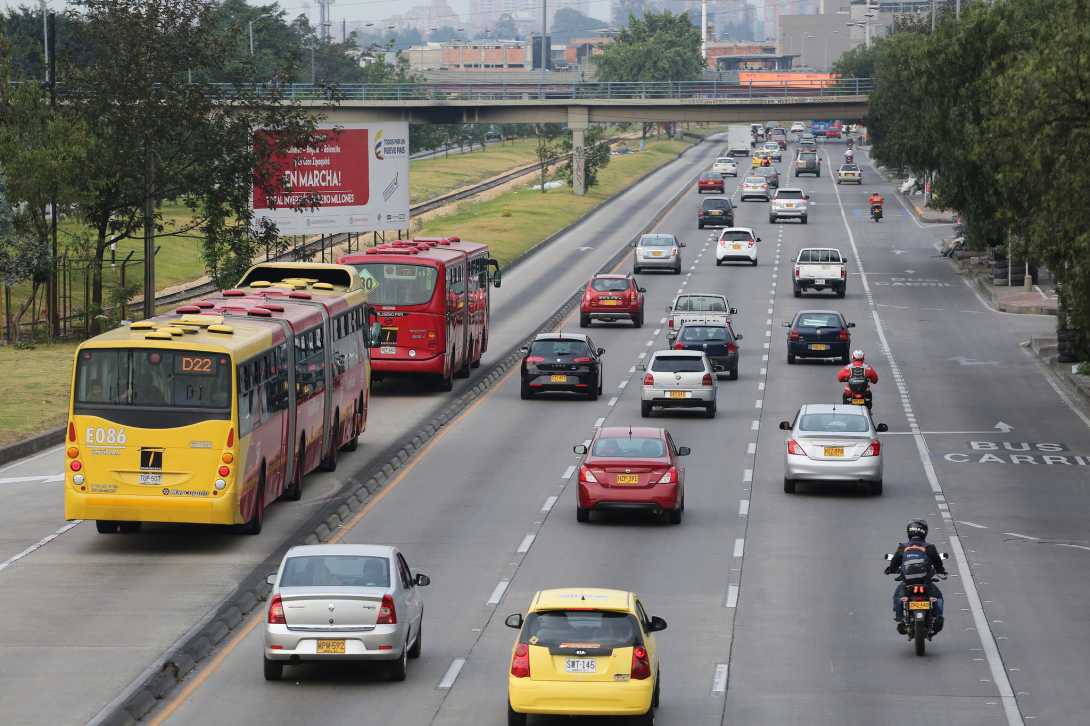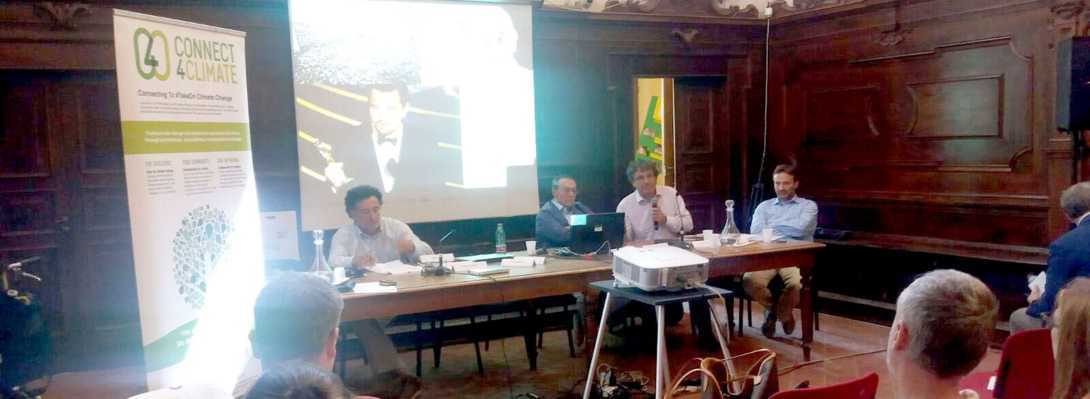The Film4Climate Global Video Competition closed for submissions at the end of September. With more than 860 videos sent in by filmmakers from 153 countries this really is a global youth call for climate action. The social media report also shows great numbers:

The Film4Climate Global Video Competition closed for submissions at the end of September. With more than 860 videos sent in by filmmakers from 153 countries this really is a global youth call for climate action.
<p>The Film4Climate social media <a href="https://www.connect4climate.org/publication/film4climate-competition-so…; target="_blank">report</a> shows great numbers and a positive impact. Some highlights:</p>
<p>- 8.7k mentions<br>
- 168 million impressions<br>
- 6.5k retweets<br>
- 121 blogs<br>
- 66 news<br>
- mentioned mostly in English and Spanish</p>
<p style="text-align: center;"><a href="http://connect4climate.org/sites/default/files/upload/film4climate-comp…; target="_blank"><img alt="" src="/sites/default/files/images/film4climate%20report.png" style="width: 1000px; height: 323px;"></a></p>
<p>The <a href="https://www.film4climate.net/" target="_blank">Film4Climate Global Video Competition</a> is the outcome of a partnership between the World Bank Group’s Connect4Climate program, the United Nations, Vulcan Productions, and the Italian energy company Enel, which has endorsed the UN’s Sustainable Development Goals and targeted carbon neutrality for its operations by 2050. Other presenting partners include the UNFCCC, UN Sustainable Development, UNEP, The Global Brain, and the Government of the Kingdom of Morocco. In addition, more than 70 collaborating partners are supporting the competition.</p>
<p>The Film4Climate Global Video Competition invited aspiring filmmakers from around the world to express their vision for a sustainable future by creating a short film or video about climate action. The competition called on filmmakers to explore Climate Action, the 13th goal under the UN Sustainable Development Goals, emphasizing what individuals and communities around the world are doing to promote action, offer solutions and inspire positive change to combat climate change and its impacts. Filmmakers were encouraged to deploy personal narratives that explore fundamental questions such as: What does climate change mean to me? What actions am I taking to mitigate the advance of global warming? What is my Climate Action message to the world?</p>
<p><strong>Bernardo Bertolucci</strong> (<em>The Conformist, Last Tango in Paris</em>) is serving as the jury president of the competition. Bertolucci is joined on the jury by Oscar-winning Directors and Producers as well as luminaries of cinema, communications and the environment, including <strong>Mohamed Nasheed</strong>, climate champion and former president of the Maldives, producer <strong>Lawrence Bender</strong> (<em>An Inconvenient Truth, Pulp Fiction</em>), director <strong>Sharmeen Obaid-Chinoy</strong> (<em>Saving Face, A Girl in the River</em>), director <strong>Louie Psihoyos</strong> (<em>The Cove, Racing Extinction</em>), director <strong>Fernando Meirelles</strong> (<em>City of God, The Constant Gardener</em>), director <strong>Robert Stone</strong> (<em>Radio Bikini, Pandora’s Promise</em>), director <strong>Mika Kaurismaki</strong> (<em>Zombie and the Ghost Train</em>), director <strong>Pablo Trapero</strong> (<em>Carancho, El Clan</em>), producer <strong>Martin Katz</strong> (<em>Hotel Rwanda</em>), <strong>Ann Hornaday</strong>, Chief Film Critic of <em>The Washington Post</em>, <strong>Sheila Redzepi</strong>, Vice President for External and Corporate Relations, World Bank Group, Moroccan director <strong>Farida Benlyazid</strong> (<em>Frontieras, Keïd Ensa</em>), <strong>Carole Tomko</strong>, General Manager and Creative Director of Microsoft co-founder Paul G. Allen’s <strong>Vulcan Productions</strong>, <strong>Maria Wilhelm</strong>, Executive Director of the Avatar Alliance Foundation, <strong>Pat Mitchell</strong>, President and CEO of the Paley Center for Media, <strong>Rose Kuo</strong>, CEO and Artistic Director of the Qingdao International Film Festival, and <strong>Mark Lynas</strong>, author and environmentalist (The God Species, Six Degrees).</p>
<p>The winning entries will receive cash prizes of $8,000, $5,000, and $2,000 for first, second and third place in each of two categories: an under one-minute Public Service Advertisement (PSA) or a Short Film up to five minutes. Winners will be announced at an awards ceremony at the United Nations COP22 Climate Summit in Marrakesh, Morocco in November.</p>
<p> </p>

From plant-based beef burgers to pay-as-you-go solar energy, it’s evident that tomorrow’s world is already here. These are just two of the ten most innovative solution finalists which will be celebrated at the annual Sustainia Award Ceremony, taking place on 3 November in Copenhagen.
Now in its fifth year, the Sustainia Award Ceremony is an international event that showcases and celebrates outstanding performance within sustainability. It is hosted by leading sustainability firm Sustainia, which has tracked more than 4,500 solutions to date from all over the world.
The ten finalists have been selected from the 2016 Sustainia100, published earlier this year, which showcases 100 solutions for a cleaner, greener and fairer future. The final nominees represent ten sectors, ranging from food to fashion, and are also mapped against the impact they make on the Sustainable Development Goals. The final solutions represent the new global context of sustainable innovation, as they are developed and deployed in five continents including countries like Peru, Korea and Afghanistan.
Morten Nielsen, Managing Director of Sustainia, said:
“As the world’s leaders have dispersed from the United Nations General Assembly, and we gear up for COP22, these finalists are a vital reminder that sustainable action is already underway. We, rightly, demand more from our politicians, but we must also focus our energy on the difference we can all make. These ten solutions show that innovation isn’t limited by geography, age, power or passion – these are the things that will help us realize our sustainable future.
All ten finalists are eligible for two award categories. The Sustainia Award is selected by the Sustainia Award Committee, led by Arnold Schwarzenegger; and the Community Award is selected by public vote. Anyone can vote for their favourite Community Award finalist, by visiting the Sustainia website.
This year’s Sustainia Award Ceremony comes at a time of mounting interest amongst global leaders for solutions to the world’s biggest challenges, across all sectors. This is something Sustainia seeks to consolidate through a new partnership with the UN Global Compact. Building on the five-year success of the Sustainia100, the two organizations have made a commitment to build a dynamic digital platform for global sustainable solutions, called the Global Solutions Platform. The new platform will launch in early 2017 and will provide a single access point to the most innovative solutions, through the click of a button.
For more information about the ten finalists for the Sustainia Award Ceremony, and for the chance to vote for the Community Award winner, visit http://www.sustainia.me/sustainia-action-forum/vote/
For more information and interview requests:
Katie McCrory / km@mm.dk / +4591405026

The Social Good Summit is a two-day conference examining the impact of technology and new media on social good initiatives around the world. Held during UN Week, the Social Good Summit unites a dynamic community of global leaders and grassroots activists to discuss solutions for the greatest challenges of our time. During the Social Good Summit, global citizens around the world unite to unlock the potential of technology to make the world a better place.

Daily more video are being submitted from around the world
Already the Flim4Climate Global Video Competition has more than 250 entries from 100 countries and counting. Each video is telling a story of how skyrocketing carbon emissions and the activities that feed those emissions are having impacts across the globe.
[video: https://youtu.be/DlYo4sq34Ew]
Each story is its own. Some films focus on the individual, others focus on groups, a few focus on countries as a whole, and others don’t focus on humans at all -instead choosing to examine animals, plants or oceans. Individually, these films leave a viewer with a unique experience, but collectively these films combine to create a wonderful mosaic of some of the biggest issues related to climate change today.
We have two weeks left to the deadline for video submissions (enter your story by September 15th), and it is already clear that the stories told through Film4Climate hit the big issues, and draw light on the often untold implications of the climate crisis. Here are three takeaways.
Take 1: Consumption junctions

Rio de Janeiro. Photo Credit: Max Edkins
If you were to blindly click on the Film4Climate gallery where all the videos are displayed (vote for your favorite), there’s a good chance you would find a film addressing consumption habits. Perhaps this increased emphasis on the electricity we use, the food we eat and the water we require, is indicative of a “post-Paris” climate movement that is beyond merely making noise directed at heads of state and obscure United Nations committees, and is instead focused on actions that drive the transition away from fossil fuels.
Of course, meeting the targets agreed upon at Paris will require governments and heads of state to keep stepping up, but as seen in so many of the Film4Climate entries, it’s the individual who really holds the power, especially when it comes to consumption. The film entries relating to electricity usage and the consequences our diets have on the planet, talk as much about the food and electricity that we don’t use as much as the food and electricity we do use. And for good reason.
When it comes to electricity use, there are a few films that simply emphasize the difference in use by telling the stories of a few people. In the developed world there are huge differences when it comes to personal energy use. In the US and Canada, for example, the average person uses about 4,500 kWh each year while a person in the UK or Germany will come in way under that by using under 2,000 kWh each year.
But variations don’t just exist in the developed world, emerging economies show wide ranges in energy use. The average person in Brazil, Mexico and China uses about 500 kWh, but in Brazil residential use per person has been the same for almost 20 years, while in Mexico it is up 50% and in China it has increased 600%. There are film submissions from all these countries devoted to consumption habits.
Of course there are a number of positive stories of innovation that lead to smarter ways of consuming electricity and energy. Many of these films are incredibly inspiring and focus on very local solutions. When it comes to reducing pollution, being smarter about energy and rethinking our diets, there are a number of films highlighting champions that we can all learn from.
Beyond energy there is a major emphasis on food in the Film4Climate competition. Again, the films are complimented well by the facts on the ground. In the United States alone, approximately 40 percent of food goes to waste. Globally, about one third of the food produced for human consumption every year - approximately 1.3 billion tons - gets lost or wasted.
Unsurprisingly, much of the food-focused films in this contest so far are devoted to exposing the damage caused by the global meat industry. The World Resources Institute studied the impact of meat consumption on the planet and found that, “reducing heavy red meat consumption — primarily beef and lamb — would lead to a per capita food and land use-related greenhouse gas emissions reduction of between 15 and 35 percent by 2050.” According to that same World Resources Institute report, “Beef uses more land and freshwater and generates more greenhouse gas emissions per unit of protein than any other commonly consumed food.”
A growing global beef industry requires more land for grazing, and that has resulted in massive clear cutting of the world’s largest rainforest. Thus, the beef consumption issue is a deforestation issue. Which brings us to...


“Everybody recognizes that if you can make very efficient electric motors, you can make a quantum leap forward”. - James Dyson
"The electric motor has become a little more well-known and appreciated over the past few years with its improving integration into our cars. With most people understanding and appreciating the impact that their pollution has on the climate, there has been a greater demand for auto manufacturers to create cars that can help to improve our environment, or at the very least, do less harm."
"It is through this demand for growth and development that some of the world’s greatest inventors have refined the electric motor to now work better and be more efficient than it ever was before."

The World Bank Group's Connect4Climate program organized a climate change discussion during the Festival of Participation promoted by the Italia, Sveglia! (Italy, Wake up!) alliance.
Hosted by the World Bank Group and supported by Italy’s Ministry of the Environment and Energy Security and Germany’s Federal Ministry for Economic Cooperation and Development, Connect4Climate (C4C) is a global partnership for a livable planet that connects, creates, and communicates to build long-lasting change for future generations.




